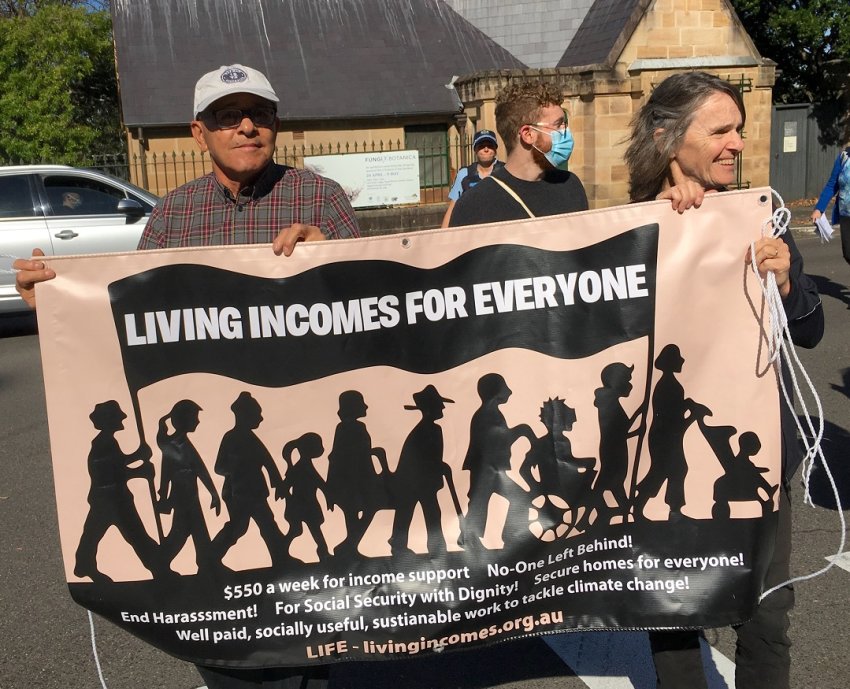
The federal government wants to roll out its cashless debit card (CDC) across the country, but the Senate refuses to agree. Activists are continuing to organise to get the trials stopped.
The Social Security (Administration) Amendment (Continuation of Cashless Welfare) Bill 2020 set out to “remove the trial parameters to establish the Cashless Debit Card (CDC) as an ongoing program”.
It failed, but the trial was extended at the end of last year to Ceduna in South Australia, the East Kimberly region and Goldfields in Western Australia and Bundaberg and Hervey Bay in Queensland. The whole of the Northern Territory and Cape York are also slated to be placed on cashless welfare payments.
The CDC program forces welfare recipients, including disability and aged pensioners, to accept compulsory income management, administered by the private financial services corporation Indue Limited.
It means that 80% of the Centrelink payment is “quarantined”.
Rent, utilities and other direct debits are paid by Indue which, in turn, is paid up to $10,000 per "client" by the federal govenrment to administer the scheme.
For those with a CDC, most legal rights and protections, including consumer and social security rights, are restricted.
Instead, clients need to negotiate with Indue whenever changes are made to debits or they have access problems.
Getting “permission” to transfer money to pay cash for, say, winter firewood, school excursions or buying fresh vegetables from a farmer’s market could become a long, drawn-out affair.
These complicated financial arrangements with Indue make it harder to manage family budgets, which almost inevitably leads to a decline in mental health.
Some research in CDC trial areas have revealed lower birth weights and a higher rate of youth suicide.
According to an ABC report in May, the federal Department of Social Services’ figures on the card’s effect in Ceduna said that CDC welfare recipients “had been prevented from spending about $220,000 on alcohol over five years”. It also said that “$70,000 were blocked by the cards in bottle shops between April 2016 and April 2021”.
Luke Greenacre, a researcher from Monash University who studied the impact of the CDC trials, said the figures are not so dramatic when the number of participants is taken into account.
“There’s about 500 people give or take on the card, and this was over a five-year period,” he said. “So $220,000, when you actually divide that by the number of people and over the number of years, that's about $80 per person, per year.
“I’m willing to bet that’s more likely the accidental use of the card. They've reached for the wrong card in their wallet when they've been trying to buy a six-pack like everybody tries to buy a six-pack every now and then," Greenacre said.
The supposed benefits touted by the government to justify the scheme have largely been anecdotal. Also, its supporting research lacks peer review.
Research from earlier trials of cashless welfare cards showed that the CDC will make lives harder.
Janet Burstall of Living Incomes For Everyone said the CDC card has become a barrier to renting, as real estate agents and private landlords know the difficulties associated with Indue. “The reality of the cashless debit cards is far more horrifying than many of us realise,” she said.
Kathryn Wilkes of No Cashless Debit Card Australia warned the scheme will adversely impact on women in abusive relationships. "For those women from lower socio-economic backgrounds, it will be harder to escape domestic violence", she said.
Women will not be able to access their money in an emergency, to rent a hotel room for example, if they are stuck on the Indue card, which is not accepted by many businesses.
The Australian Council for Social Services, which was partially successful in pushing for the JobSeeker allowance to be raised, has yet to shift its focus to stopping the CDC expansion plans.
The “robodebt” scheme, which fleeced between $721 million and $1.5 billion from 470,000 people using an automated data matching scheme, shows how dangerous the partial privatisation of the social security system is: it puts lives on the line.
The CDC will put more vulnerable communities at risk. It is a form of economic apartheid that will only further reinforce social divisions and exacerbate socioeconomic disadvantage.
[Sign an online petition to MPs to stop the CDC trial by July 21. For more information and to get involved visit No Cashless Debit Card Australia, SN7 Resources and LIFE. Watch an online seminar, organised by Living Incomes For Everyone, featuring Kathryn Wilkes and Amanda Smith.]